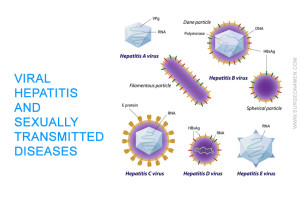Viral hepatitis
Hepatitis is swelling of the liver, which may be due to a fungal, bacterial, viral, or parasitic infection. It may be caused by heavy alcohol or drug use, bacterial or viral infections, toxins, and certain drugs. The infection may begin as acute and become chronic over a period of time, especially if left untreated.
Viral infections of the liver are categorized as hepatitis A, B, C, D, and E.
Hepatitis B
This type of viral infection of the liver spreads from Hepatitis B virus (HBV), which is transmitted through contact with infectious bodily fluids or puncture wounds. A person may be infected from the saliva, blood, or semen of an infected person.
The risk of infection increases with intercourse with an infected partner, injection drug use, or sharing razors, needles, syringes, or any drug-injection equipment with an infected person.
An infected pregnant mother can transfer infection to her baby during childbirth.
The infection may spread by mucosal exposure to various body fluids, including infected blood, menstrual, saliva, vaginal, and seminal fluids.
Unvaccinated men that have sex with more than one partner or sex workers are more prone to the sexual transmission of hepatitis B.
Viral hepatitis affects over 1.25 million people in the United States, with the disease affecting 350 million people worldwide.
Though some people with the infection do not show up any signs, some others may show:
- Headache
- Muscle pain
- Low grade fever
- Jaundice or yellowing of the skin & eyes
- Loss of appetite

- Fatigue
- Vomiting, nausea, diarrhea
- Stomach pain
- Change in urine color
- Pale bowel movements
Diagnosis of Viral Hepatitis
Immediately consult your doctor if you see any signs of infection, though in a majority of acute infection cases, symptoms do not show up. The doctor may conduct a physical exam and other blood tests to diagnose infection and look for signs of viral infections or antibodies produced by the body in response to virus.
As its name suggests, acute viral hepatitis is a short-term infection of the liver caused by a virus. It is primarily caused in the initial stages of infection, which can be mild or severe. However, if left untreated, acute infection can become chronic infection, which can become long-lasting and last a lifetime.
A potentially life-threatening infection, viral hepatitis is caused by hepatitis B and C viruses. Chronic infection can further cause liver failure, cancer, or liver cirrhosis. The virus can survive for 7 days outside the body and cause infection upon entering the body of a person that hasn’t had undergone vaccination.
All children below 18 years of age who have not been vaccinated are at a high risk of viral hepatitis infection. Other high-risk groups include:
- People who inject drugs
- Health care workers exposed to blood and other bodily fluids
- People that often require blood or blood products
- Recipients of organ transplants
- Persons with multiple sexual partners
- Travelers who have not received vaccination and visit endemic areas
Acute or advanced cirrhosis can cause liver failure. Liver transplantation is an option for such patients with impending liver failure. Timely vaccination is a must to prevent the infection from Hepatitis B virus. Certain medications are administered to reduce inflammation and delay complications caused by cirrhosis.

